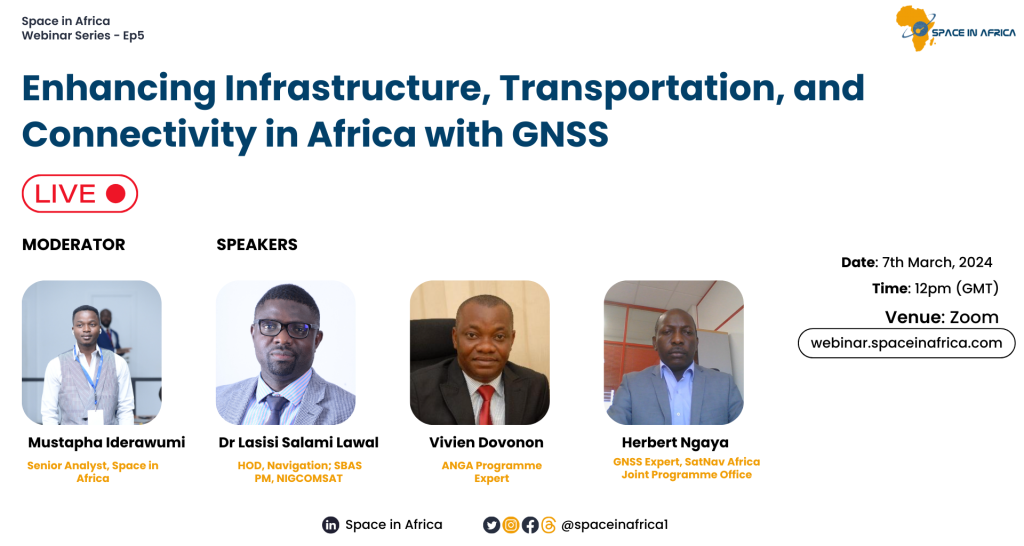On February 7, 2024, Space in Africa hosted its fifth webinar series titled “Enhancing Infrastructure, Transportation, and Connectivity in Africa with GNSS.” The webinar provided a platform for participants to gain insights from experts representing key stakeholders leading SBAS implementation in Africa. These experts included representatives from the SatNav-Africa Joint Programme Office, the Agency for Aerial Navigation Safety in Africa and Madagascar (ASECNA), and the Nigerian Communication Satellite Ltd (NigComSat).
The event featured speakers, including Dr Lasisi Salami Lawal, who holds multiple positions within NigComSat. He serves as the Acting General Manager for Technical Services, Head of the Navigation department, SBAS Project Manager, and NigComSat-2 Payload Line Manager. Other speakers included Vivien Dovonon, ANGA Programme Expert, and Herbert Ngaya, GNSS Expert from the SatNav Africa Joint Programme Office (JPO). Mustapha Iderwaumi, a senior analyst at Space in Africa, moderated the webinar.
During the webinar, speakers discussed the necessity of a continental Satellite-Based Augmentation System (SBAS) to improve the accuracy and precision of existing Global Navigation Satellite Systems (GNSS) such as GPS, GLONASS, BeiDou, and Galileo. They also provided updates on the current implementation status of SBAS in Africa and outlined the anticipated benefits once it becomes fully operational on the continent. Additionally, the discussions underscored the practical applications of GNSS/SBAS technology in various sectors, including aviation, agriculture, maritime, and geo-information services.
Diverse participants from various African sectors and organisations, including researchers and academics interested in GNSS and SBAS technology, attended the webinar.
Key Takeaways from the Event
While giving an overview of the SBAS programme in Africa, Mr Herbert discussed the origin of SBAS implementation. He highlighted the events leading to establishing the Satnav-Africa Joint Programme Office (JPO) and its pivotal role in satellite navigation. He emphasised the significance of key dates, highlighting milestones such as the first African-EU summit in Cairo, Egypt, in 2000 and subsequent meetings in Lisbon, Portugal, in 2007 and Tripoli, Libya, in 2010. During these gatherings, Mr Herbert noted discussions centred on the African-EU partnership and formulating strategies and action plans for satellite navigation development. The cooperation initiated during the 2010 summit catalysed programmes like the Support to Earth Transport and Satellite Applications in Africa, which spawned significant projects such as the TREGA initiatives. An initial project focused on capacity building for African stakeholders through working sessions, while TREGA facilitated the establishment and operationalisation of GNSS infrastructure in Africa, leading to the creation of the Satnav-Africa JPO in 2021.
Mr Herbert underscored the importance of SBAS in Africa, particularly in sectors like aviation, where well-defined requirements drive technological advancements. He outlined a roadmap proposed by the JPO for SBAS implementation in Africa, encompassing the classification of GNSS infrastructure networks, SBAS development, and PPP corrections broadcasting.
While responding to NigComSat’s role in the uptake of SBAS in Africa, Dr Lasisi discussed NigComSat-1 R’s multifaceted capabilities, highlighting its status as a hybrid satellite utilised primarily for satellite communication (satcom) purposes through various bands such as C Band, U Band, and KA Band. He emphasised that the L-Band feature, primarily dedicated to navigation overlay services, holds significant potential for satellite-based augmentation systems (SBAS) to improve integrity, accuracy, availability, and precision in GNSS applications.
Dr Lasisi underscored the importance of SBAS in enhancing safety standards, particularly in aviation, in alignment with regulations set by bodies like the International Civil Aviation Organisation (ICAO). He emphasised the necessity of multilateral cooperation to effectively implement SBAS, considering its coverage area extends beyond national borders and even across continents. He elaborated on collaborative efforts with international partners, regional economic blocs such as ECOWAS, EAC, SADC, and AMU, and institutions like the African Union Commission and the African Space Agency. Regarding recent developments, Dr Lasisi mentioned events such as the showcase of SBAS capabilities within Nigerian airspace using NigComSat-1R, outreach activities on SBAS adoption, and discussions on continent-wide SBAS implementation during workshops and conferences. He expressed optimism about the progress towards operational SBAS services, which are projected to commence this year, with ongoing efforts to expand ground infrastructure coverage across Africa and its surrounding waters.
In response to the question regarding the role of SBAS in enhancing aviation safety across Africa, particularly in areas with limited ground-based infrastructure, Mr Vivien discussed the challenges faced by Africa due to the inadequate availability of ground-based navigation aids, particularly in comparison to other regions worldwide. He highlighted that more than 60% of African airports lack essential navigation infrastructure, such as Instrument Landing Systems (ILS) and Distance Measuring Equipment (DME), which are crucial for precision approach. Furthermore, he emphasised the significance of the Performance-Based Navigation (PBN) concept introduced by the International Civil Aviation Organisation (ICAO) as a viable solution for Africa to enhance safety, efficiency, and accessibility at airports without additional ground-based infrastructure investments. Mr Vivien underscored the accessibility and versatility of GNSS, especially GPS, as the primary component of PBN applications, which can support all flight phases.
Regarding SBAS, a key component of GNSS, Mr Vivien highlighted its potential to improve flight safety through enhanced accuracy, continuity, and integrity of GPS information. He discussed the ANGA programme (Augmented Navigation for Africa), led by ASECNA, aimed at providing safety-of-life services in Africa and the Indian Ocean region. The programme mainly focuses on geometric guidance to prevent accidents like controlled flight into terrain. Mr Vivien emphasised that the ANGA programme aligns with ICAO requirements and has been assigned identification number 7, recognised in Volume One of the International Civil Aviation Convention. He concluded by noting that the benefits of SBAS extend beyond aviation and can be utilised across various industries and sectors.
While discussing the diverse application of SBAS beyond the aviation sector, Mr Herbert noted the widespread applications of satellite navigation technology beyond aviation, emphasising its relevance across various sectors. He said that while aviation has been a frontrunner in adopting this technology, its benefits extend to other industries. He highlighted the versatility of satellite navigation systems like GPS in addressing the positioning, navigation, and timing needs of multiple sectors, including maritime, road, automotive, and agriculture. Mr Herbert echoed the sentiment that precision agriculture, in particular, stands to gain significantly from satellite navigation technologies due to their ability to optimise farming practices. Furthermore, he emphasised the importance of accurate timing provided by GNSS for sectors such as electricity and telecommunications, enabling synchronisation of equipment and networks. Mr Herbert also pointed out emerging sectors like drones and the Internet of Things (IoT), where satellite navigation is critical in providing precise positioning information for efficient operation.
Answering the same question regarding the diverse application of SBAS beyond the aviation sector, Dr Lasisi disclosed the significance of accurate location data, particularly concerning airports equipped with Instrument Landing System (ILS) runways, which are essential for safe aircraft landings. He emphasised the importance of specific navigation systems like RNAV and RNP, highlighting their role in enhancing aviation safety. He proceeded to present an assessment of GNSS usage across Africa, pointing out airports lacking ILS or RNAV capabilities. Dr Lasisi highlighted the potential impact of precision agriculture, maritime navigation, and location-based services on Africa’s economy and development goals, particularly in addressing food security and poverty alleviation. Moreover, he emphasised the importance of GNSS technologies in disaster management, citing examples of their use in monitoring and predicting natural disasters such as landslides and dam collapses. Dr Lasisi stressed the role of precise positioning systems like GNSS PPP in mitigating the impact of such events and safeguarding lives.
Regarding how ASECNA aims to provide seamless integration and interoperability of SBAS in African airspace, Mr Vivien discussed the importance of interoperability in navigation systems, noting its significance for seamless traffic management, communication, and surveillance systems. He highlighted the role of the ANGA programme in fostering interoperability through participation in international forums such as the ICAO’s Interoperability Working Group.
During these meetings, representatives from various service providers worldwide, including the FAA from the United States, the European Space Agency, China, Japan, and India, gather to discuss development plans, standardisation issues, harmonisation, and operational use of SBAS. Mr Vivien emphasised the collaborative nature of these discussions, which address technical challenges and promote the adoption of SBAS technology. Additionally, he mentioned ANGA’s involvement in the ICAO Navigation System Panel, where discussions revolve around the maturity of new navigation systems and research outcomes. Mr Vivien concluded by reaffirming the sector’s commitment to integrating and interoperating navigation systems at regional and international levels to facilitate the development and operation of SBAS globally.
Source: https://africanews.space/enhancing-infrastructure-transportation-and-connectivity-in-africa-with-gnss-excerpts/



